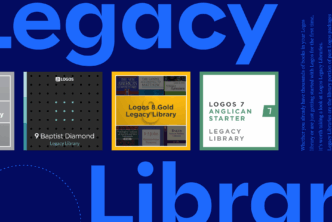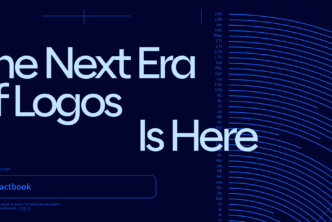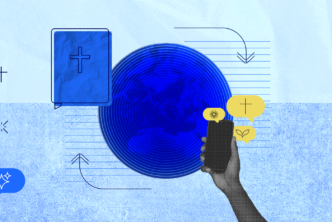Logos’s mission to serve the church has led us to greater refinements and—the single feature our beta testers were most excited about—greater speed.
Let’s talk through a simple example of work you might do in Logos. Logos is here to help you study the Bible, of course, so let’s use Logos to study “the Bible.”
Factbook
You can always search for “Bible” in the Factbook. It’s a great place to start when you don’t have any more specific ideas. Just click the Factbook icon in the toolbar, and type “Bible” in the locator bar that comes up.
Depending on what books you have in your library, you’ll get a quick report linking you to resources that discuss this all-important topic.
And in Logos, we’ve invested in more detailed descriptions for many historical church events and people that are cataloged in Factbook.
Translate
You never know where your searches will take you in Logos. Let’s imagine that you end up at one of the key systematic theology texts written in America in the nineteenth century, the work of Princeton’s Charles Hodge. Hodge, like a lot of pre-twentieth-century theologians, uses a fair bit of untranslated Latin. And in his discussion of the doctrine of Scripture, he has just such a paragraph.
With Logos, you can now select Latin (or German or French or other modern languages likely to be present in theological works) and get an instant machine translation. Just select the text and click the translation icon in the pop-up menu.
This becomes this:
| In scriptura sancta habet universalis Christi Ecclesia plenissime exposita, quæcunque pertinent cum ad salvificam fidem, tum ad vitam Deo placentem. | In the Holy Scriptures the universal Church of Christ has fully set forth everything that pertains to saving faith and to a life pleasing to God. |
What was once an impenetrable tangle of Latin declensions is now a simple English sentence relevant to the topic we’re studying. Machine translation is not perfect, but it is far better than nothing—something which cannot be said for all translation.
Search your print books in Logos
Your library almost certainly includes more than just electronic books. Even the most dedicated Logos users typically have some resources on a technology known as “paper.” For example, another nineteenth-century theologian who has been finding a lot of readers in recent years is Herman Bavinck—and you may possibly have his four-volume work of systematic theology on your physical shelves.
With Logos 10, you can search Bavinck’s work even if you don’t own the book in Logos format. Just use the mobile app to scan the barcode on the back, and search results from the book will appear right alongside those from your digital library.
Bavinck wrote a great deal about the Bible in Reformed Dogmatics, and the index to the print volumes is obviously a great help. But nothing beats the search capabilities—and speed—of a computer. Search for “Bible” and “Scripture” within Bavinck’s multivolume work, and Logos will get you to the right page.
Timeline
If you dig deep into the doctrine of Scripture, you’ll run into some of the more arcane and interesting elements of its history—like the textual history of the Hebrew Bible. In this field of study, you’ll encounter names of groups like the “Masoretes,” the school of Jewish scribes and scholars who had custody of the text of the Hebrew Bible for centuries during the Middle Ages. The Masoretes get a rather large block in the timeline tool: their work lasted for centuries.
Logos is about exploration, about interesting rabbit trails. Selecting any of the other intriguing points on the timeline around the work of the Masoretes can send you on further Bible study journeys. All kinds of archaeological finds and other events and persons relevant to the history of the Bible are visible in the timeline tool.




